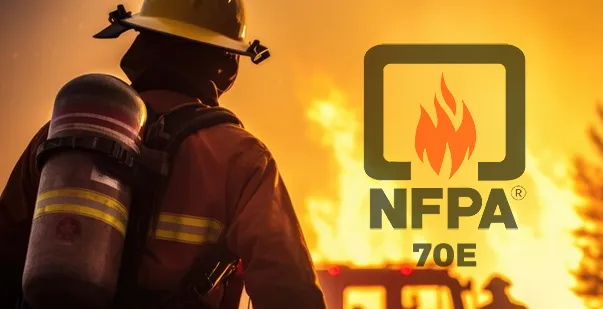What Is the Purpose Of NFPA 70E?
11/25, 2024 vishal

Electrical accidents have become increasingly common in most industries. Thousands of injuries and sometimes fatalities occur every year just because proper safety measures have not been established. Such cases occur due to improper training or handling at workstations around the electrical systems.
To reduce such risks NFPA 70E provides detailed electrical work safety standards. These guidelines would bring the workplace much closer to achieving enhanced safety, avoid expensive accidents, and keep employees in great health. If one wants to read further about the NFPA 70E, In the following sections we have discussed key elements of NFPA 70E, how it reduces electrical hazards, and why it is very crucial for any workplace involving electrical systems.
To all those interested in knowing more about NFPA 70E, we will discuss in the following sections its purpose, how it reduces electrical hazards, and why it is important to any workplace that deals with electrical systems. Keep reading.
What is the NFPA 70E Training?
NFPA 70E Standard for Electrical Safety in the Workplace Online Training is a 6-hour in-depth look at the fundamentals of helping to protect lives on the job while also reducing injuries. It also deeply explores OSHA violations, and liabilities. This course's expert-developed exercises and instruction teach you how to identify and minimize your exposure to electric shock, arc flash, arc blast, electrocution, and other potential hazards.
How to Get an NFPA 70E Certification
To get your NFPA 70E certification, you'll want to take an accepted training program that covers the latest electrical safety guidelines in the workplace. Make sure the training abides by the National Fire Protection Association, as outlined in their 70E standard.
It's especially important for workers exposed to electrical hazards such as arc flash, shock, and electrocution dangers. OSHA accepts NFPA 70E as a guide that can be used to satisfy the requirements for electrical safety of the workplace. This course is therefore of much importance to a firm in terms of meeting compliance and safety at work.
NFPA 70E Course Information:
Topics Covered: Hazard evaluation, PPE, LOTO procedure, and emergency response are among the common topics covered in a training course on NFPA 70E. The training course also helps you understand how to identify and eliminate electrical hazards.
Requirements: To pass the certification, one has to achieve a score of 70% or more in the quizzes and the final exam to be sure of knowing everything.
Format: Many NFPA 70E courses are online and self-paced, so available to busy professionals 24/7. This way, you may review the materials as often as you like before sitting for the final test.
Who Should Take NFPA 70E Training Course?
The NFPA 70E course is highly advised to numerous professionals who work with electrical equipment or handle environments where hazardous electrical conditions exist.
Electrical Workers
Electricians and electrical workers also need the NFPA 70E training. Registered electricians and maintenance workers operate closely on electrical systems over 50 volts. People handling arc flashes and electrical shocks go back into the workplace where there are electrical systems exposed. NFPA 70E training ensures they meet OSHA's safety standards.
Managers & Supervisors
Facility Managers and Supervisors will also benefit from NFPA 70E training. These are managers who manage a team that works with electrical systems or equipment. The NFPA 70E will prepare the facility managers to enforce and implement electrical safety in their teams.
Utility Workers
Linemen, and utility workers can also enroll in this training course. Exposure and familiarity of high voltage environments means familiarity with safety work practices. Training also helps them assess and select appropriate Personal Protective Equipment, that is mandatory to prevent incidents related to electrical hazards.
Safety Experts
Safety experts working at a job site, including those that specifically address electrical safety issues, are vital attendees. NFPA 70E training equips them to analyze hazards and create a safer working environment for an organization, keeping them compliant with OSHA requirements.
New/Inexperienced Workers
New workers exposed to electrical systems for the first time require foundational safety practices as a part of NFPA 70E training. This involves the identification of hazards and their associated risk reduction techniques.
Any worker or contractor operating electrical work, especially in the workplace, should prefer this course because it ensures perfect safety compliance and preventive measures. A person at work with hand-on activities or supervising NFPA 70E certification helps reduce the risks of injury and ensures compliance in safety measures at work.
The Purpose of NFPA 70E
The main purpose of NFPA 70E is to guard workers against electrical hazards. This includes arc flashes, electric shocks, and arc blasts, through comprehensive standards for electrical safety. After obtaining guidelines from NFPA 70E, organizations can reduce risks associated with electrical work by building on practices like safe work, proper personal protective equipment, risk assessments, and training for employees.
Learning Objectives Of NFPA 70E Training
The NFPA 70E training course prepares participants for application of practical knowledge along with tips to safely manage workplace electrical hazards. Key learning objectives commonly include the following.
Knowledge of Risk Assessments
The trainees should apply the risk assessment processes for controlling electrical hazards required in the guidelines under NFPA 70E and OSHA. These comprise: awareness of possible electrical hazards, how appropriate controls help and how personal protective equipment should reduce risks.
This course focuses on hazard identification and risk reduction techniques, teaching one how to analyze the work environment to spot and eliminate electrical dangers before they cause harm.
Safe Work Practices
Participants gain insight into safe operational practices, such as proper lockout/tagout procedures, use of electrical safety devices, and ways to safely work on or near energized equipment.
Maintenance and Equipment Safety
Equipment maintenance is also included so that failure-related injuries are avoided. It teaches how maintenance impacts safety as well as what bad maintenance would do to raise risks.
Emergency Response
This is another central goal in ensuring workers respond well to electrical events. It incorporates first aid and rescue methods for electric accidents.
Compliance Knowledge
The course increases the knowledge base related to regulatory requirements with OSHA and NFPA , one of the necessary compliance measures for safety at work.
Whereas training under NFPA 70E is given to the participants who learn the applicable standards, it also allows for the possibility of both hands-on and scenario learning. The training is conducted in such a way that safety protocol execution can be achieved within a realistic setting.
Note From LearnTastic
Maintaining compliance with NFPA 70E ensures that companies protect their workforce and avoid the possibility of costly incidents and liabilities. Since OSHA recognizes NFPA 70E as a consensus standard, it is an integral part of enforcing electrical safety practices.
Committing to this standard creates a culture of safety and shows the organization's dedication to the well-being of its workforce and adherence to regulatory guidelines. NFPA 70E training makes the workplace safer and more responsible, keeping health and safety values to the forefront, as priority.
References:
https://www.nfpa.org/product/nfpa-70e-online-course/p0070eol












